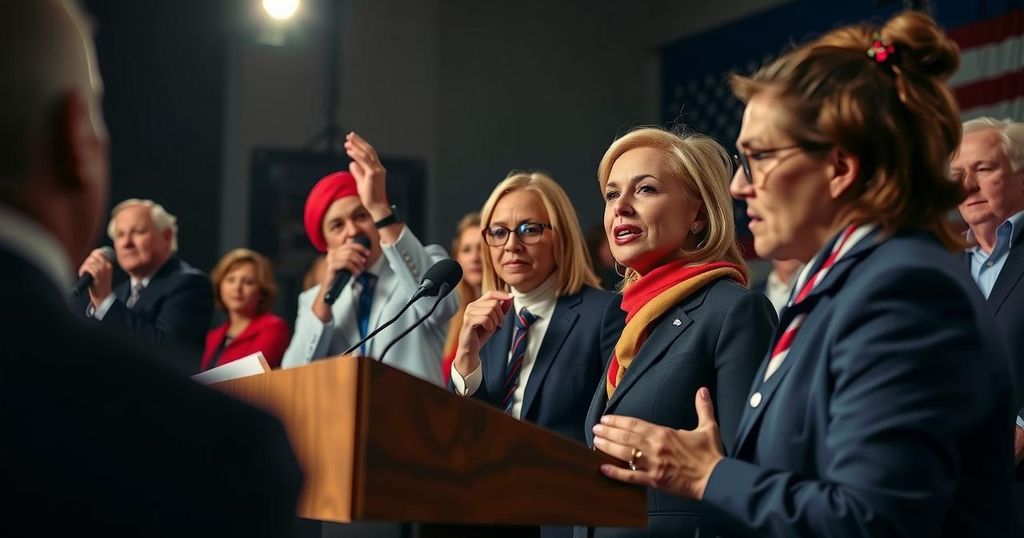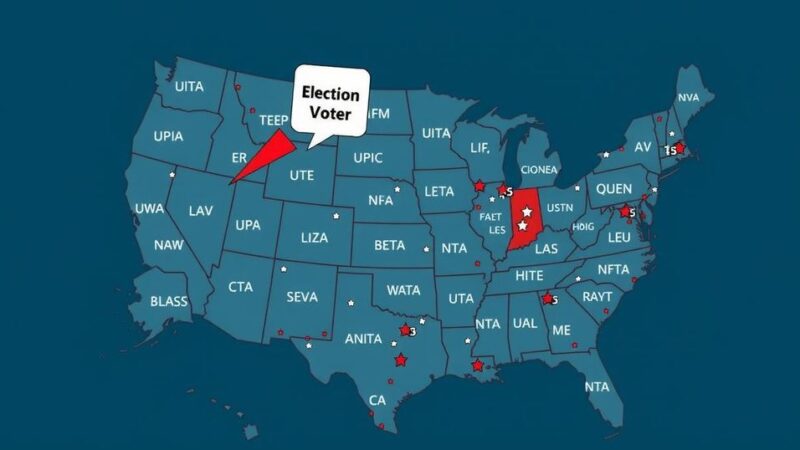Former President Donald Trump’s campaign is marked by extreme rhetoric against immigration, promising strict border security and a massive deportation operation. This approach is mirrored by Vice President Kamala Harris, who is adopting more hardline immigration policies, reflecting a broader political shift towards restrictive immigration measures within both liberal and conservative parties in the U.S. and internationally. The rise of far-right parties in various nations has influenced mainstream political discourse, leading to a notable decline in the protection of asylum rights and increased political exploitation of immigration concerns. As the upcoming presidential election emphasizes immigration as a pivotal issue, there are significant implications for asylum seekers and the broader migrant community amidst escalating barriers and stringent policies.
In a stark presentation, former President Donald Trump has emphasized a narrative of immigration as a threat, declaring that he would enact the largest deportation operation in U.S. history if reelected. During a recent rally in Aurora, Colorado, Trump proclaimed, “We will close the border. We will stop the invasion of illegals into our country. We will defend our territory. We will not be conquered.” His confrontational rhetoric extends to labeling undocumented immigrants as violent criminals in a Wisconsin speech, stating that they would “enter your home and cut your throat.” Conversely, as the political landscape intensifies with Trump and Vice President Kamala Harris as prominent candidates, analysts observe that both liberal and conservative parties are adopting increasingly restrictive positions on immigration, mirroring a global trend. Harris, despite being perceived as generally aligned with more progressive values, has demonstrated a commitment to enhancing border restrictions. Her campaign materials indicate her support for hiring thousands more border agents, reinforcing existing tough border control measures to address immigration issues. Experts contend that the amplified political discourse surrounding immigration highlights the pervasive influence of far-right ideologies that have seeped into mainstream dialogue. Petra Molnar, a lawyer and anthropologist specializing in migration, remarked, “There’s this spectre of being overrun by ‘the other’ that has always been there… but it seems to have filtered into the entire conversation around immigration.” Historically, the weaponization of immigration rhetoric has been prevalent in U.S. presidential contests, dating back to figures like Republican candidate Pat Buchanan, who in 1992 declared immigration a national disgrace. However, scholars now argue that opinions and policies that were once deemed fringe have gained mainstream acceptance, significantly undermining the principles of asylum that have been predominantly upheld in international law. This phenomenon is not limited to the United States. It comprises a broader political shift in Europe as nations such as France, Germany, and the U.K. have witnessed far-right parties gaining traction by promising stringent immigration policies. In the U.K., the Reform UK Party achieved a notable electoral performance, while Germany’s Alternative for Germany (AfD) celebrated success in state elections. The increased mileage that immigration provides as a political issue can be attributed to socio-economic tensions engendered by austerity measures, which leave immigrants vulnerable to politicization. Judith Sunderland from Human Rights Watch noted that, “Far-right populist parties have been on the rise… and they’ve made immigration a real flashpoint issue.” In light of these challenges, mainstream political parties, both on the left and right, have begun to adopt more hardline stances in a bid to quell the rise of the far right. Consequently, Western governments have implemented stringent immigration restrictions that often contravene international norms regarding asylum. For instance, recent measures in Poland and Finland have involved suspending the right to petition for asylum. The 2024 electoral cycle has placed immigration as a pivotal issue among American voters, following a Harvard poll indicating it is a primary concern, second only to inflation. Meanwhile, President Joe Biden has faced bipartisan scrutiny due to a surge in border crossings, leading him to alter his prior stance on immigration policies, a shift that has led to the continuation of Trump’s stringent measures. Harris intends to uphold these restrictive policies while also proposing an expansion of legal immigration pathways. Notably, during her campaign, she has underscored her commitment to imposing harsher penalties for immigration violations and affirmed that asylum seekers must apply at legal ports of entry to qualify for asylum services. Despite some differentiating factors, experts suggest that both Harris and Biden seem preoccupied with counteracting accusations of lax immigration controls, complicating discussions around the benefits of migration and the moral responsibilities associated with aiding those escaping hardship. This complex interplay of political dynamics accentuates the challenges faced in addressing immigration as both a humanitarian necessity and a contentious political issue.
The article addresses the shift in U.S. political rhetoric regarding immigration, highlighting how both major parties, particularly through the lenses of Donald Trump and Kamala Harris, are embracing increasingly hardline positions. This trend reflects a broader global movement towards restrictive immigration policies driven significantly by the rising influence of far-right parties, which are capitalizing on socio-economic anxieties and fears related to immigration. The historical context of immigration politics in the U.S. serves to illustrate the evolving nature of such discussions, revealing the shifting landscape of societal attitudes towards immigrants and asylum seekers, while raising concerns about the erosion of established asylum rights.
In conclusion, the evolving dynamics of U.S. immigration policy reflect a marked shift to the right, with both major parties increasingly adopting restrictive views that align with the far-right’s rhetoric. This trend underscores a broader global pattern of heightened anti-immigrant sentiment and policies, influenced by socioeconomic factors and political maneuvering. The implications of these changes are significant, raising concerns about the future of asylum rights and the treatment of migrants, while indicative of the growing conflation of immigration with national security issues in diverse political contexts.
Original Source: www.aljazeera.com






